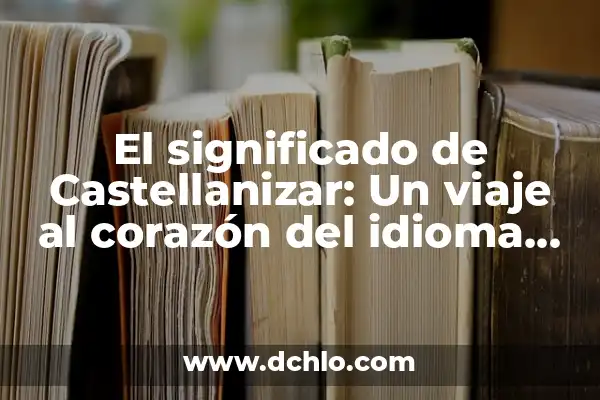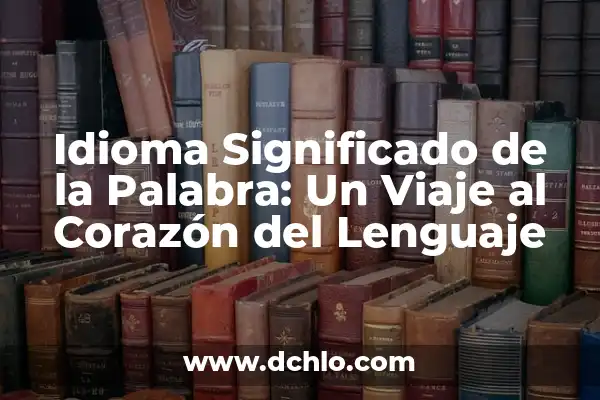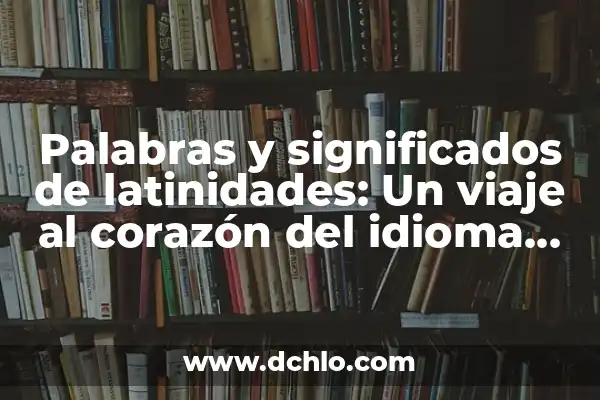Dio es un término que puede tener diferentes significados depending on the context in which it is used. In this article, we will explore its meanings, uses, and curious facts related to this word.
¿Qué significa dio?
Dio is the third person singular past tense of the verb dar, which means to give in English. For example, Él dio un regalo a su amigo translates to He gave a gift to his friend.
In addition to its use as a verb, dio can also refer to other things, such as the name of a character in mythology or a term used in specific contexts.
Curiosity: The word dio is also the name of a moon in astronomy, specifically one of the moons of Jupiter.
También te puede interesar

El significado de Castellanizar: Un viaje al corazón del idioma español
El español, como lengua viva y dinámica, ha atravesado por numerous procesos de evolución a lo largo de la historia. Uno de los conceptos más relevantes en este contexto es el de *castellanizar*, un término que se refiere a la...

Idioma Significado de la Palabra: Un Viaje al Corazón del Lenguaje
El idioma, como expresión de la comunicación humana, es más que un simple conjunto de palabras. Es una ventana a las culturas, historias y pensamientos de las comunidades que lo habitan. En este artículo, exploraremos en profundidad el significado de...

Palabras y significados de latinidades: Un viaje al corazón del idioma que dio vida a muchos más
Introducción:

Buscar significado de palabras en guarani: Un viaje al corazón del idioma
En el amplio mundo de las lenguas indígenas, el guaraní emerge como un idioma rico y lleno de matices. Buscar significado de palabras en guarani no solo es una tarea lingüística, sino también un viaje cultural hacia el corazón de...

Descubriendo el Corazón de la Vida
La célula, la unidad biológica fundamental, es el pilar sobre el que se construye la vida. Este fascinante mundo microscópico revela los secretos de cómo los seres vivos funcionan. Sin las células, la vida tal como la conocemos sería imposible.

Palabras de Paraguay con significado: Un viaje al alma de su idioma
En este artículo, exploraremos el fascinante mundo de las palabras de Paraguay con significado, términos que reflejan la riqueza cultural y la identidad de este país sudamericano. A través de estas expresiones, descubriremos cómo el lenguaje se convierte en un...
La conjugación del verbo dar en el pasado
One of the most common uses of dio is as part of the conjugation of the verb dar. The verb dar is highly irregular in Spanish, and its past tense conjugation is as follows:
– Yo di
– Tú diste
– Él/ella/usted dio
– Nosotros dimos
– Vosotros disteis
– Ellos/ellas/ustedes dieron
This verb is essential in Spanish grammar, as it is used to express the act of giving something to someone.
Ejemplos de uso de dio
Here are some examples of how dio is used in sentences:
- Ella dio las gracias al profesor. (She thanked the teacher.)
- El niño dio un paso adelante. (The boy took a step forward.)
- El gobierno dio un comunicado oficial. (The government issued an official statement.)
- Dio un grito de alegría al escuchar la noticia. (He shouted with joy upon hearing the news.)
These examples show the versatility of dio in different contexts.
El significado más allá de la gramática
Beyond its grammatical meaning, dio can evoke emotions and actions that go beyond the literal act of giving. For instance, in the phrase dio la vida por su país, it implies sacrifice and heroism.
This word carries a deep emotional weight in many expressions, making it a powerful tool in communication.
Los diferentes significados de dio
Dio can have several meanings depending on the context. Below is a list of its possible interpretations:
- Past tense of the verb dar.
- Name of a character in Greek mythology.
- Abbreviation for dioptre, a unit of measurement in optics.
- Name of a moon orbiting Jupiter.
Each of these meanings adds complexity to the word, making it a fascinating term to explore.
El papel de dio en la oración
In a sentence, dio often serves as a verb, indicating an action that occurred in the past. For example:
– Dio un abrazo a su hermano. (He gave his brother a hug.)
– La maestra dio una charla sobre el tema. (The teacher gave a lecture on the topic.)
[relevanssi_related_posts]Its role is crucial in conveying past actions in Spanish.
¿Para qué sirve dio?
Dio is used to describe past actions involving giving, transferring, or providing something. For example:
– Dio comida a los necesitados. (He gave food to those in need.)
– Ella dio consejos útiles. (She gave useful advice.)
It is also used in expressions like dio la bienvenida (gave a welcome) or dio la espalda (turned his back).
Otras formas de dio
Dio is part of the verb dar, which has many forms depending on the tense and mood. Some of its other forms include:
– Present: doy, das, da, damos, dais, dan
– Future: daré, darás, dará, daremos, daréis, darán
– Imperative: da, dé, demos, dad, den
Understanding these conjugations is essential for mastering the verb dar.
La importancia de dio en el español
Dio is a fundamental word in Spanish, as it is used in everyday conversations to express past actions related to giving. Its versatility allows it to be used in both literal and figurative contexts.
For example:
– Dio un regalo de cumpleaños. (He gave a birthday gift.)
– Dio su apoyo a la causa. (He gave his support to the cause.)
El significado de dio
The primary meaning of dio is the past tense of the verb dar, which means to give. However, as mentioned earlier, it can also refer to other things, such as a name or a term in specific fields.
Its most common use is in grammar, where it is used to describe actions that occurred in the past.
¿Cuál es el origen de dio?
The word dio comes from the Latin verb dare, which also means to give. Over time, the verb evolved into dar in Spanish, and dio became the third person singular past tense form.
This etymology is shared with other Romance languages, such as French (donner) and Italian (dare).
Sobre el término dio
In addition to its use in grammar, dio can refer to other things, such as the name of a character in Greek mythology or a term in science. For example, in optics, dio is an abbreviation for diopter, a unit of measurement for the refractive power of a lens.
This versatility makes dio a term with multiple layers of meaning.
¿Cómo se usa dio en diferentes contextos?
Dio is used in various contexts, from grammar to mythology. In Spanish, it is primarily used as a verb, but it can also refer to names or scientific terms.
For example:
– Dio un discurso inspirador. (He gave an inspiring speech.)
– Dio es un personaje de la mitología griega. (Dio is a character in Greek mythology.)
Cómo usar dio y ejemplos de uso
To use dio correctly, it is important to understand its grammatical role and the context in which it is used. Below are some examples:
- Ella dio un paseo por el parque. (She took a walk in the park.)
- Dio las gracias a todos los presentes. (He thanked everyone present.)
- El profesor dio una clase muy interesante. (The teacher gave a very interesting class.)
These examples illustrate how dio is used to describe past actions involving giving or transferring something.
INDICE

